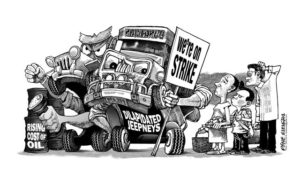
If anything, a transport strike that may occur anytime within this month in Cebu and some parts of Central Visayas if not across the country, may serve as a good reminder and even a solid impetus for the Duterte administration to reconsider its position on imposing excise taxes on fuel prices.
Last Tuesday’s P1 peso increase on some fuel products may not be much for the privileged rich few who can afford more than one car — okay, they may complain a little but not to the point of marching down the streets or at least not yet — but it is painful to the struggling passenger jeepney driver and mostly to the commuter who had to tighten the belts further and stretch their budgets to new, untested limits.
That said, all that tax money collected by the government should go somewhere and not just to the pockets of the soldiers and the police whom President Rodrigo Duterte pledged to raise their salaries to turn them away from the lure of drug money.
In fact, a substantial part of that tax revenue was supposed to go to the government’s “Build, Build, Build” program that includes modernizing public transport.
Part of that modernization program is the phaseout of the aging passenger jeepneys that is supposed to be completed in March next year.
While this is ongoing, there is supposed to be a fuel subsidy program that is supposed to cushion the impact of high fuel prices for public utility vehicle (PUV) operators.
That phaseout had been opposed time and again by the operators, some of whom had called on the government to give them modern, environment-friendly jeepneys free of charge if they are supposed to comply with the mass transport modernization program.
Barring that option, the jeepney operators still insist on filing a fare rate increase by reasoning that the fuel subsidy isn’t even enough for them to buy a modern jeepney that is compliant with government standards on minimizing pollution.
Given these conditions it is a no-brainer to see that the biggest loser in this equation is the commuter who are not only burdened with increased taxes but higher fare rates.
There is a correlation between higher fuel prices caused by excessive taxes, higher fare rates and the mass transport modernization program pursued by government whose rationale is that it will ultimately benefit the riding public in the long term.
But in modernizing public transport, the Duterte administration should learn when to step on the brakes, fix the visible problems such as excessive taxes on fuel and then undertake programs aimed at easing the transition from old modes of public transport to new, more accessible, more affordable and effective mass transport.